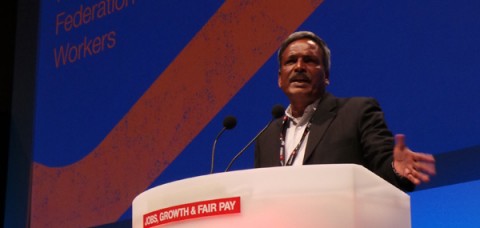Read a moving speech made by Amirul Haque Amin, President of the National Garment Workers’ Federation to Trade Unions Congress on September 8, 2013.
It is my pleasure that I represent Bangladeshi garment workers. This is an opportunity to share the conditions, the situation, the fight, the challenge, and the struggle of Bangladeshi garment workers with you, the members of the TUC.
Friends and comrades, while we are at TUC Congress, in Bangladesh there are still more than 100 injured workers of Rana Plaza who have been in hospital for the last four and a half months.
While we are at Congress, more than 500 children between 3 months and 8 years are in an uncertain situation, having lost their parents, some of them lost their father, some of them lost father and mother, both.
Nearly 1,400 injured workers, though discharged from hospital, still need more and better treatment.
In the Rana Plaza collapse 1,133 workers were killed and those 1,133 workers’ families and 500 injured workers are still waiting for compensation.
Five months before, on 24th November, a fire also happened in Tazreen fashion factory, where 112 workers were killed and another 150 workers were seriously injured.
From the Rana Plaza collapse, and the Tazreen fashion fire, it is clear that the Bangladeshi garment workers’ sector is not a safe workplace. That is the reason we, the local trade unions, as well as global trade union federations, with the support of foreign labour rights groups, initiated the Bangladesh Fire and Building Safety Accord; a union Accord.
Up to now, 86 multinational companies have already signed this Accord but, unfortunately, eight more multinational companies based in the UK, including Matalan, River Island, and Republic, did not up to now sign this Accord.
On behalf of the Bangladeshi garment workers I am asking you, please, raise your voice and send a very clear message to the eight companies to stop killing workers, end the death traps, come forward and sign the Accord, and ensure a safe workplace for Bangladeshi garment workers.
Friends and comrades, in Bangladesh at present, there are 5,000 garment factories, 3.6 million workers are working, and 85% of them are women. The garment and textile sector covers 79% of total exports.
But still today the minimum wage for the Bangladeshi garment workers is only £24 in a month. Even the skilled sewing machine operators only get between £32 to £42 in a month. Bangladeshi garment workers need a living wage.
As a local trade union we are fighting with our government. We are fighting with our local business people and factory owners but again to ensure the living wage for the Bangladeshi garment workers we need to campaign at multinational companies.
The multinational companies will say that, ‘Yes, the living wage is very important and this is needed for the workers,’ but, on the other hand, these multinational companies always are pressuring the local business people and factory owners to decrease the price of the product, so this situation is totally contradictory. On the one hand, they will advise for the living wage but, on the other hand, they will pressurise to decrease the price so that the living wage cannot happen.
That is the reason we again ask you to please send a very clear message, pay the fair price for the garment products to ensure the living wage for the Bangladeshi garment workers.
Friends and comrades, we know very well we are in the worst situation but we also know that you, the workers, and people in the UK are also not in a good position. You are also facing a lot of problems, especially in the case of social security, pensions, and other benefits.
Now is the time to fight together. This is the high time to work together. It’s high time to raise our voice in unity to challenge the multinationals together. Let’s fight united for better conditions, for a better life and for a better society.
Workers of the world unite! Thank you, everybody.
Take action
Show solidarity with Bangladesh’s garment workers by writing to the clothing brands who still need to sign the Accord. Send an email now via GoingToWork.org.uk
